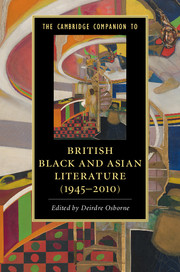Book contents
- Frontmatter
- Dedication
- Contents
- Contributors
- Acknowledgements
- Timeline
- Introduction
- PART I TRACES AND ROUTES
- PART II TRANSLOCATIONS AND TRANSFORMATIONS
- PART III RESTORATIONS AND RENOVATIONS
- 7 Recalibrating the Past: The Rise of Black British Historical Fiction
- 8 Black Women Subjects in Auto/biographical Discourse
- 9 British Black and Asian LGBTQ Writing
- 10 The Poetics and Politics of Spoken Word Poetry
- 11 Post-colonial Plurality in Fiction
- PART IV NATIONAL, INTERNATIONAL, TRANSGLOBAL
- Further Reading
- Index
- Series list
10 - The Poetics and Politics of Spoken Word Poetry
from PART III - RESTORATIONS AND RENOVATIONS
Published online by Cambridge University Press: 05 September 2016
- Frontmatter
- Dedication
- Contents
- Contributors
- Acknowledgements
- Timeline
- Introduction
- PART I TRACES AND ROUTES
- PART II TRANSLOCATIONS AND TRANSFORMATIONS
- PART III RESTORATIONS AND RENOVATIONS
- 7 Recalibrating the Past: The Rise of Black British Historical Fiction
- 8 Black Women Subjects in Auto/biographical Discourse
- 9 British Black and Asian LGBTQ Writing
- 10 The Poetics and Politics of Spoken Word Poetry
- 11 Post-colonial Plurality in Fiction
- PART IV NATIONAL, INTERNATIONAL, TRANSGLOBAL
- Further Reading
- Index
- Series list
Summary
Poets are notoriously resistant to categorisation. In Britain, as elsewhere, the spoken word category encompasses a wide range of poets, a large proportion of whom are black and Asian Britons. Yet, as Kwame Dawes observes, poets who perform their work are often keen to escape such labels as ‘performance poet’. Many poets also regard the terms ‘spoken word poet’ or ‘spoken word artist’ as reductionist. ‘Spoken word poetry’ itself is a contested category, implying the separateness of oral and printed poetry. Such distinctions touch on the sensitive issue of literary status, pointing to a long-standing poetic injustice in Britain whereby influential publishing houses rarely endorse poetry associated with the performance scene. The lack of parity between so-called ‘page’ and ‘stage’ poets points to a long-running, unresolved argument in Britain about what poetry is and who it is for, an argument that reaches back to the British poetry revival of the 1960s.
This chapter challenges some persistent assumptions about spoken word poetry's province and provenance, given the considerable contribution of British black and Asian writers. It places spoken word poetry in the context of the wider devolution of literary culture, emphasising the pivotal role of non-metropolitan localities in its development, to ultimately question the idea that British spoken word poetry is, and always has been, an urban form.
Provenance
It should not be said that poets of the 1980s inaugurated Britain's spoken word scene. More accurately, post-1980s British Asian and British black poets have recuperated and developed British poetry revival poetics, bringing them into dialogue with popular traditions such as dub poetry. This confluence of ideas has proved productive. Spoken word's transnational routes have obscured its 1960s British literary origins and British black and Asian poets, who reinaugurated Britain's ‘submerged’ traditions of performance, collectively integrating the national performance scene into the international world of poetry.
Advocates of spoken word poetry routinely observe that all poetry has its roots in orality. As John Coutts notes, ancient poetry was orally transmitted. The semi-literate medieval world of Chaucer's Canterbury Tales marks the emergence of printed poetry in English literary history, coinciding with the development of the printing press. Male writers especially, including John Agard, Fred D'Aguiar and Linton Kwesi Johnson, are umbilically connected to 1960s British poetry, when the form reached giddy heights of popularity, with charismatic performances in mass readings throughout the country.
- Type
- Chapter
- Information
- Publisher: Cambridge University PressPrint publication year: 2016
- 1
- Cited by



